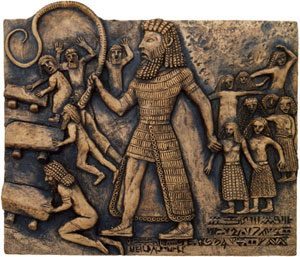Hi, Rody – so you see yourself poised to make a choice between pagan spirituality and “civilised” (presumably secular?) values, and possibly some mixture of the two. Let’s think this through.
My approach, as you know, is to go back to basics and consult the Alienation Theory of History. The dichotomy you describe is analogous to that between the hunter-gatherer (pagan spirituality) and agrarian settler (civilised values). I won’t dwell on this point too much; I mention it mainly to create a broader sense of context.
Having done so, let me reference certain characteristics associated with each state, based on other people’s historical observations and my own personal experience. I shall single out one each: egoism in the case of pagan spirituality and alienation in the case of civilised values.
The spirituality of the pagan is spontaneous and creative. There is a subjective element: the pagan feels a personal affinity to the deity. If it’s mediated at all, it’s mediated by charismatic individuals (priests, druids etc.) rather than by highly developed and literate institutions. In such a culture, the personal and ecstatic mix freely. Solipsism is never more than a step away. (I’m simplifying and generalising, obviously, but don’t stop me now….)
“Civilised values” evolve over time but a constant theme is the individual’s relationship with the state. This is the core of The Epic of Gilgamesh: for Gilgamesh to become a good king, he had to experience love, loss, grief and acceptance of death. His building of the wall at the end of the story marks the transition, but his labours convey no sense of spiritual vitality: he is reconciled but alienated, too.
Build that wall, Gil (Source: www.baruch.cuny.edu)
The simple egoism of ordinary people is a given. It has its roots in prehistory but is visible everywhere in our consumer-driven, celebrity-led society. If you immerse yourself in your pagan spiritual impulse, you risk losing yourself to your ego, and giving yourself up to extreme subjectivity.
As for the alternative, I believe that some degree of alienation is the price we pay for being part of a civilised society. At the most basic level, it means being able to subordinate one’s own impulses to the greater good. At the extreme, of course, it could mean losing yourself entirely, and enabling the abstractions and mechanisms of the world to corrode and even dissolve your sense of self.
I’m inclined to think there’s a middle way: rather than choose one over the other, stake out some neutral space for yourself between them, where egoism on one side and alienation on the other become the boundaries within which you can be your own man.
You may not need much to be free and fulfilled in that small world: common sense, love, decency, self-respect and respect for others would be, I imagine, a good start. It’s a humble way to live, but (to my mind, at least) it has the attraction of being independent from those two invidious extremes of the human condition.
Does that help?
Stranger.


